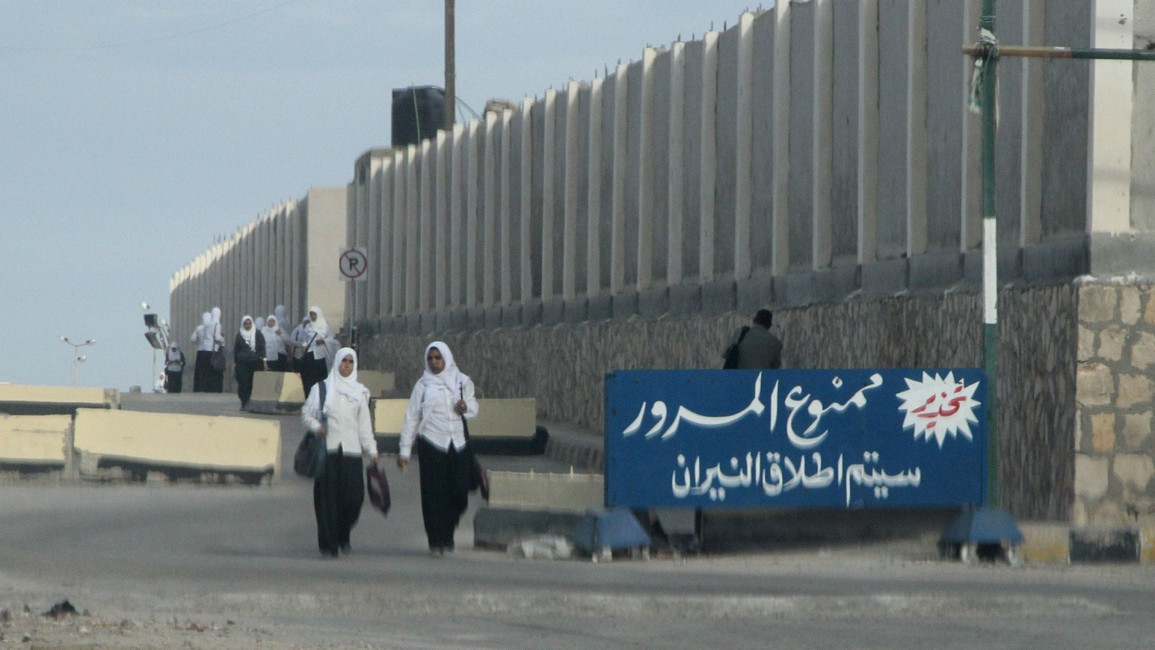
Egypt's Sinai stuck between two terrorisms
The truth behind what is going on in the Sinai cannot be understood just by looking at the January 29 attacks and the recent militant activity in the peninsula.
One must look back at the alleged peace deal between Egypt and Israel, which depopulated Sinai and left those who remained vulnerable to exploitation and manipulation.
For 30 years, the Mubarak government helped entrench the present state of affairs. After the 2011 revolution, Sinai residents finally rejoiced and savoured a brief moment of freedom and hope, in anticipation of more rights and freedoms.
However, the two recent periods of military rule - the first between the revolution and former president Mohammad Morsi's election and the second after the coup - have made the situation in the Sinai worse, because of the oppressive practices and forced displacement of locals the army has carried out there.
Sinai's inhabitants suffer from two real terrorists: the Zionists who have wreaked havoc there since the establishment of neighbouring Israel in 1948 and the Egyptian military, since 1952. The situation has only become worse since the 3 July coup.
| Wilayah Sinai: a growing threat in Egypt's Sinai. Read more |
The ongoing violence is a response to the army's actions in Sinai. It is not logical to expect that the unjustified killings and displacement of people continue without any form of retaliation.
| The ongoing violence is a response to the army's actions in Sinai. |
It is also possible that foreign intelligence services have meddled with the situation, aiming to destabilise the area. Israel, for example, would have no interest in stabilising the area - until it can take it over.
Impartial mediator no more
Egypt since the coup has lost its role as an impartial mediator that could be relied on in negotiations between Arab countries and Israel, which was obvious during last year's aggression against the Gaza Strip.
Since the coup, dozens of reports have emerged documenting intelligence coordination between the Egyptian military and Israel to overthrow Morsi, depopulate the Sinai and get rid of Hamas. Security delegations' trips between the two countries are another indication of this conspiracy.
"Operation Sinai", a military campaign announced by the army following an attack on soldiers in 2012 during Morsi's presidency, made no contribution to the fight against terrorism - the objective of the campaign - as it had no clear plan and took the form of random attacks in response to the loud provocation of the local media.
The operation focused on air raids that did not distinguish between real targets and civilians, which lead to many civilian deaths and increasing hostility to the army and its soldiers.
The failure of the operations and policies of the army and police in Sinai after the coup was confirmed by the expansion of the buffer zone along the border with Gaza, but this is not the only example, as the operation failed from the get go.
| Egypt evicts 2,000 families to expand Gaza buffer zone. Read more here |
The reports and statements that came from military spokesmen and commanders were often full of inconsistencies, unclear and many times inaccurate.
The failure
The army cannot get rid of what they call "terrorist groups" in Sinai, but neither does it want to do so.
It is trying to use the situation to create fear among its regional and international backers, and because its capabilities and the natural terrain of the area mean it is difficult to wage war on deeply embedded armed groups.
This, combined with the army's focus on security solutions instead of political solutions, means that no solution is forthcoming.
The continuation of these destructive policies after the coup may be intended to get the US-led coalition against the Islamic State group (IS, formerly known as Isis) to strike positions of Ansar Bait al-Maqdis in Sinai, which has pledged allegiance to the IS group.
Egypt's new president called for this himself at the July 2014 African Union Summit, at the UN in September 2014 and on his trips to the US, Russia, China and other countries.
| The army cannot get rid of what they call 'terrorist groups' in Sinai, but neither does it want to do so. |
Given the careless policies and their failures in Sinai, the new Egyptian government, established after the July 2013 coup, has directed accusations against foreign parties, first against Hamas and its military wing, the Qassam Brigades.
These accusations ruined Egypt's role as a mediator in negotiations between Palestinians and Israel.
The coup government declared Hamas should be banned in March 2014, then it sat with Hamas officials in July 2014 and proposed an initiative between them and Israel.
At the same time as the coup government regarded Gaza its strategic enemy, this regime hosted a conference to rebuild Gaza in October 2014, with no real results.
This shows the real disparity between what its announced and what happens. But the final outcome is that Egypt and its current military government cannot be an impartial mediator in the future, as it has continued with its accusations against Hamas and ignored the results of its actions in Sinai, which will not resolve the crisis.
This can only further aggravate the situation - and possibly even spark a civil war in Egypt.
Sinai will be where it starts, by virtue of its strategic importance and terrain - and as a response to the actions of the army and police.
Opinions expressed in this article remain those of the author and do not necessarily reflect the opinions of al-Araby al-Jadeed, its editorial board or staff.
This is an edited translation from our Arabic edition.



